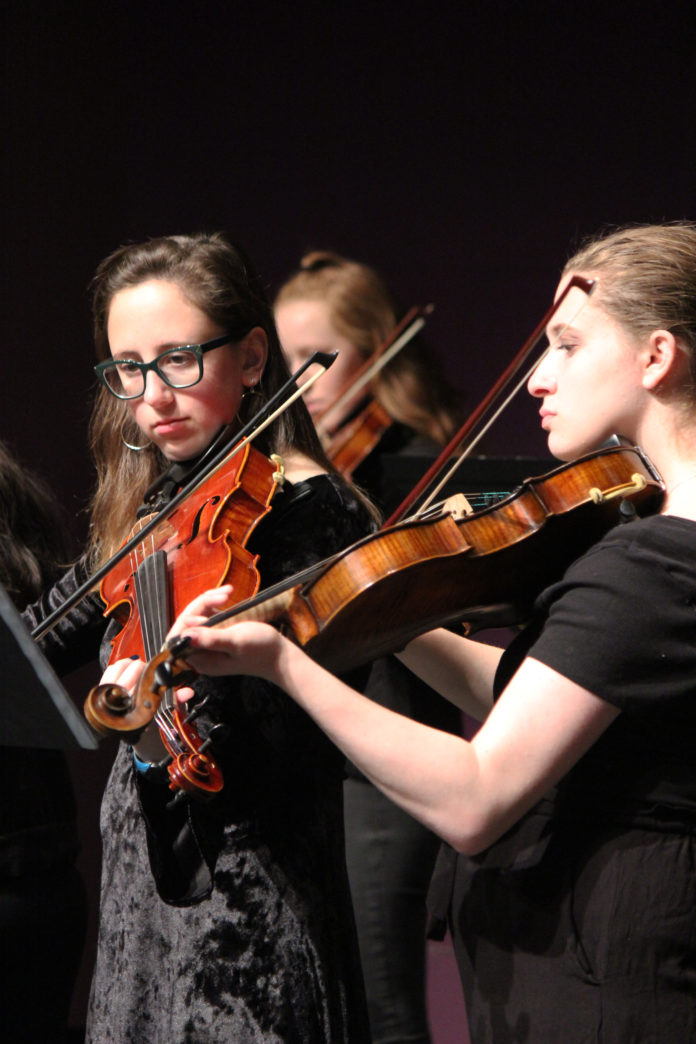A stimulating symphony of sounds joined the rhythm of the long awaited warm April weather this past weekend as the Chamber Orchestra, Wind Ensemble and Musica da Camera held their spring concerts in the Baker Center for the Arts on Friday, April 5 and Sunday, April 7.
The weekend of musical festivities began with the chamber orchestra concert. Directed by Daniel Boring, professor of Music Theory, the chamber orchestra concert took place last Friday, April 5 at 7:30 p.m. in the Paul C. Empie Theater.
The performance included repertoire from six different composers, with classics such as “Sonnerie de St. Geneviève du Monte-de-Paris” composed by Marin Marais and “Rosamunde Overture, D.644” by Franz Schubert, to more contemporary compositions like Radiohead’s “Paranoid Android” or a selection of Hans Zimmer’s “Suite from Pirates of the Caribbean: On Stranger Tides” including: “Guilty of Being Jack Sparrow,” “Angelica” – Bolero, “Mermaids,” “Blackbeard” and “End Credits.” The concert concluded with “Bachianas Brasileiras No. 5” by Villa-Lobos and then Zequinha de Abreu’s “Tico-Tico no Fubá.”
The “Bachianas” was a particular bit of note as it is one of the many pieces under Villa-Lobos’ repertoire that applies to his Choros series. Choros refers to a group of orchestral pieces that Villa-Lobos labeled himself. The name also refers to a Brazilian genre of music titled choro, that is known as a highly virtuosic type of music that usually consists of string instruments and a wind instrument (such as a flute). Often fast and insanely complex, the genre can oftentimes be associated with jazz music — but it’s important to note that these two genres are still very distinct and different. Villa-Lobos no doubt titled his collection of compositions purposely to associate with the popular genre.
The musical momentum picked back up again on Sunday at 3 p.m in the Empie Theater., beginning with The Muhlenberg College Wind Ensemble. The wind ensemble concert, titled “An Afternoon of Song and Dance,” was directed by Dr. Andrew Ardizzoia, Assistant Professor of Music, Director of Composition and Instrumental Studies.
The wind ensemble performance, consisting of both students and faculty, began with a selection of songs leading up to an intermission.
The concert opened with Nancy Galbraith’s “Danza de los Duendes” and then continued with “Shenandoah” composed by Frank Ticheli, “Three American Hymns” by Luigi Zaninelli and then a transition to Excerpts from The Firebird by Igor Stravinsky. Following the intermission, they continued on with a series of Shakespeare excerpts from Othello, Two Gentlemen of Verona and A Winter’s Tale, to name a few of the Shakespearean snippets.
The Shakespeare excerpts were part of a Ron Nelson’s “Danza de los Duendes,” with each dance representing an aspect of a Shakespeare play. Nelson himself described that his work is meant to be “a suite of Renaissance dances which were characteristic to five European countries during the 1500s. Three of the dances (Basse Dance, Pavane, and Allemande) are meant to emulate the music of Claude Gervaise by drawing on the style of his music as well as the characteristics of other compositions form that period.”
The piece moves smoothly through what appears to be scene and moment — accentuating key scenes within the Shakespeare plays in question. It’s important to note, however, that these excerpts are reflections of actual dances of the time meant to express not only ability but class status.
The performances continued on Sunday evening, with Musica da Camera at 7:00 p.m. in the Recital Hall. The performers included: Caya Goodspan-Layman ‘22 on violin, Margaret Jackson ‘20 on violin and viola, Melissa Reph ‘20 on clarinet, Avital Zemer ‘22 on violin, Vincent Trovato on piano and as the coach and graduating senior Katarina Liberatore ‘19 on violin.
There was music featured from a total of six composers, including Wolfgang Amadeus Mozart, Reinhold Glieère, Tamas Beischer-Matayo, George Gershwin, Dmitri Shostakovich and Bohuslav Martinu.
The selections from Mozart included Trio in Eb Major, K. 498, nicknamed Kegelstatt, meaning “a place where skittles [ninepins] are played.” The music was originally composed in 1786, and was the first composer to write for the combination of the piano, clarinet and viola.
Glieère’s “Douze Duos pour 2 violons, Op. 49,” Beischer-Matyó “Hasznalatienekek,” Gershwin’s “Preludes for Piano,” Shostakovich’s “Funf Stucke fur 2 Violinen und Klavier” and Martinu’s “Sonata Pro Dvoje Housle A Klavir” were the additional performances of the evening.
Beischer-Matyó’s piece, “Hasznalatienekek,” translates from Hungarian to mean “Songs for Use on Tunes of Calvinist Folk Songs.”
Overall, the weekend was filled with a diverse array of performances across each of the musical ensembles.
Sydney Coplin is a senior majoring in Media and Communication. She is currently spending her final semester of college interning and studying in Washington, D.C. She has previously been on staff as News Editor and Managing Editor.






















